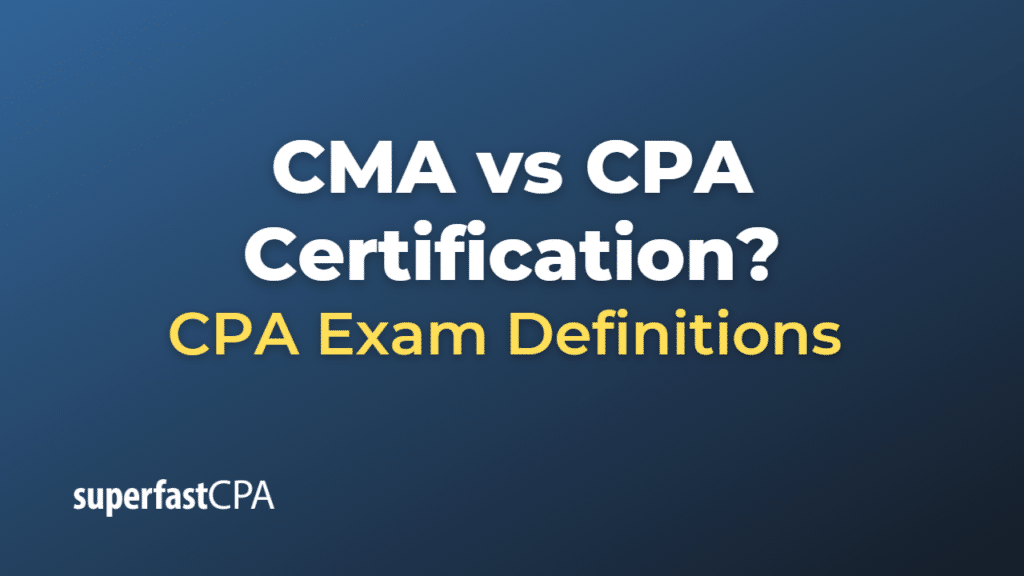CMA vs CPA Certification
The CMA (Certified Management Accountant) and CPA (Certified Public Accountant) are two well-regarded professional certifications in the field of accounting and finance. Both certifications have their own merits, requirements, and career implications. Here’s a comparison of the two:
CMA (Certified Management Accountant):
- Focus: The CMA certification emphasizes management accounting, financial planning, analysis, and decision support. It is geared towards professionals who work within organizations and aim to advance their careers in corporate finance, strategic planning, or cost management.
- Administering Body: The CMA is administered by the Institute of Management Accountants (IMA).
- Requirements: To become a CMA, candidates must have a bachelor’s degree, two years of relevant work experience, and pass a two-part examination covering topics such as financial planning, analysis, control, decision support, and professional ethics.
- Applicability: The CMA certification is globally recognized, with professionals working in various industries, including manufacturing, services, and non-profit organizations.
- Career Opportunities: CMAs often hold positions such as financial analyst, controller, CFO, cost accountant, and finance manager.
CPA (Certified Public Accountant):
- Focus: The CPA certification is focused on public accounting, including auditing, taxation, financial reporting, and regulatory compliance. CPAs typically work in public accounting firms, government agencies, or serve as consultants, providing services to a variety of clients.
- Administering Body: The CPA is administered by the American Institute of Certified Public Accountants (AICPA) in the United States. Each state has its own Board of Accountancy that sets specific requirements for licensure.
- Requirements: To become a CPA, candidates must have a bachelor’s degree, meet a certain number of accounting and business credit hours (usually 150), pass the Uniform CPA Examination, and fulfill work experience requirements, which vary by state.
- Applicability: The CPA certification is predominantly recognized in the United States, but it also holds value in other countries.
- Career Opportunities: CPAs work in various roles, such as auditor, tax advisor, financial consultant, and forensic accountant.
Conclusion:
The choice between the CMA and CPA certifications depends on an individual’s career goals and interests. If you are more interested in management accounting and working within organizations, the CMA might be a better fit. On the other hand, if you plan to focus on public accounting, auditing, and taxation, the CPA certification would be more appropriate. Both certifications are highly respected in the field and can lead to career advancement, higher salaries, and broader job opportunities.
Example of CMA vs CPA Certification
Here are two examples, one for each certification, to help you understand how the CMA and CPA certifications might impact the careers of two different individuals:
Example 1: CMA – Certified Management Accountant
Meet Jane. She has a bachelor’s degree in accounting and has been working as a financial analyst at a manufacturing company for three years. Jane is interested in management accounting and wants to advance her career within the organization, focusing on strategic planning, budgeting, and cost management.
Jane decides to pursue the CMA certification to improve her skills and knowledge in these areas. After meeting the education and work experience requirements, she studies for and passes the two-part CMA examination. As a result, she earns the CMA designation.
With the CMA certification, Jane’s career prospects within her company and industry significantly improve. She is promoted to a senior financial analyst role and, eventually, becomes the finance manager overseeing budgeting and financial planning for her organization. The CMA certification provides Jane with the knowledge, skills, and recognition needed to advance her career in management accounting.
Example 2: CPA – Certified Public Accountant
Meet John. He has a bachelor’s degree in accounting and has been working at a regional public accounting firm for two years, primarily focusing on auditing and tax services for clients. John wants to enhance his career in public accounting and is interested in providing a broader range of services, such as financial consulting and forensic accounting.
John decides to pursue the CPA certification to gain credibility and expertise in these areas. After completing the necessary educational and work experience requirements, he studies for and passes the four-part Uniform CPA Examination. As a result, he earns the CPA designation.
With the CPA certification, John’s career opportunities expand significantly. He is promoted within his public accounting firm and starts providing financial consulting services to clients. Over time, he becomes a partner at the firm and develops a reputation as an expert in forensic accounting. The CPA certification provides John with the skills, knowledge, and recognition needed to advance his career in public accounting.
In both examples, the CMA and CPA certifications help Jane and John, respectively, advance their careers in their chosen areas of accounting and finance. The choice of certification depends on each individual’s interests, career goals, and the specific industry or sector in which they want to work.













